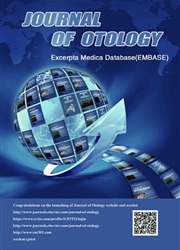

 中文摘要:
中文摘要:
目的探讨突发性聋伴良性阵发性位置性眩晕(benign paroxysmal positional vertigo,BPPV)患者的预后。方法回顾性分析105例突发性聋患者的临床资料,根据有无伴眩晕以及体位试验的结果分为三组:突发性聋伴BPPV组(13例)、突发性聋伴非BPPV眩晕组(27例)、突发性聋不伴眩晕组(65例),比较三组患者治疗前后的听力情况。结果突发性聋伴BPPV组与突发性聋伴非BPPV眩晕组听力损失较突发性聋不伴眩晕组重,且预后相对较差。结论BPPV是突发性聋的不良预后因素,耳石手法复位对BPPV治疗有效。
 英文摘要:
英文摘要:
Objective To report treatment outcomes of idiopathic sudden sensorineural hearing loss (ISSNHL) with benignparoxysmal positional vertigo (BPPV). Methods Clinical data from 105 patients with ISSNHL were reviewed retrospectively.Patients were divided into 3 groups based on vertigo symptoms and results of positional test, namely, ISSNHLwith BPPV (n = 13), ISSNHL with non BPPV vertigo (n = 27) and ISSNHL without vertigo (n = 65),for analysis of relationshipbetween hearing improvement and BPPV. Results Patients with ISSNHL and BPPV or non BPPV vertigo displayedworse hearing loss and had significantly less improvement as compared to those without vertigo. Conclusions BPPV is apoor prognostic factor in ISSNHL, but successful otolith repositioning can be achieved by proper canalith repositioning techniques.
 同期刊论文项目
同期刊论文项目
 同项目期刊论文
同项目期刊论文
 期刊信息
期刊信息
